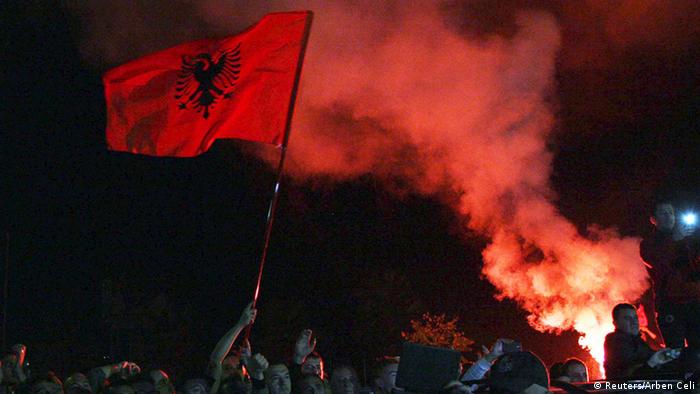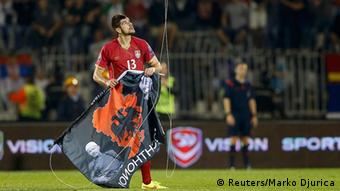Nationalism gaining strength in Serbia, Albania
Albanian Prime Minister Edi Rama has postponed a visit to Serbia, amid political tensions between the two countries following violence at a football match. Nationalism on both sides is on the rise.
Aleksandar Sekulic's workdays aren't always this busy. The young human rights activist has been traveling across Serbia, visiting Albanian-owned shops and snack bars targeted by nationalistic attacks.
At least a dozen bakeries and snack bars in the north of the country have been vandalized or torched by Serb nationalists in the last few days, with a bomb even being used in one case. Even a mosque was targeted.
According to Sekulic, who works for the Belgrade-based NGO Youth Initiative for Human Rights, "it's pure luck" that no one was killed. The Serb government and society in general have condemned the attacks. A few suspects have been arrested.
Pointing the finger
The Euro 2016 qualifier between Serbia and Albania - abandoned last Tuesday in Belgrade - is to blame for the renewed tensions.
Chaos erupted when a remote-controlled drone carrying a banner glorifying Albanian territorial aspirations appeared above the pitch. Albanian nationalists envision a land comprising Kosovo, parts of Serbia, Macedonia, Montenegro and Greece.
The banner was a signal for Serb hooligans to storm the pitch and attack Albanian players. After the game, Vienna saw massive rioting between members of the two ethnic groups.
Red-hot nationalism has flared on both sides since the incident, with "enemy" flags being burned and calls for genocide spreading online. DW has also received user comments along those lines. As has happened so often in the past, both sides are pointing an accusing finger at the other party.
"The Albanian public ignores the fact that one shouldn't defend nationalist Albanian symbols," Sekulic told DW. "On the other side, in Serbia, they are using the banner attack to justify racist campaigns in stadiums and violence against Albanians."
Politicians on both sides have fanned the flames in the media.
Serb President Tomislav Nikolic claimed that Albanians generally hate Serbs, and will do so for centuries to come, while Albania's Prime Minister Edi Rama said the Serbs have once again proven themselves to be notorious nationalists and racists. dw de



No comments:
Post a Comment